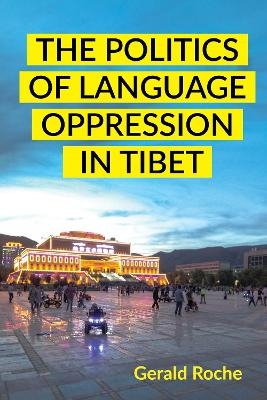
The Politics of Language Oppression in Tibet
Seiten
2024
Cornell University Press (Verlag)
978-1-5017-7778-3 (ISBN)
Cornell University Press (Verlag)
978-1-5017-7778-3 (ISBN)
In The Politics of Language Oppression in Tibet, Gerald Roche sheds light on a global crisis of linguistic diversity that will see at least half of the world's languages disappear this century.
Roche explores the erosion of linguistic diversity through a study of a community on the northeastern Tibetan Plateau in the People's Republic of China. Manegacha is but one of the sixty minority languages in Tibet and is spoken by about 8,000 people who are otherwise mostly indistinguishable from the Tibetan communities surrounding them. Recently, many in these communities have switched to speaking Tibetan, and Manegacha faces an uncertain future.
The author uses the Manegacha case to show how linguistic diversity across Tibet is collapsing under assimilatory state policies. He looks at how global advocacy networks inadequately acknowledge this issue, highlighting the complex politics of language in an inter-connected world. The Politics of Language Oppression in Tibet broadens our understanding of Tibet and China, the crisis of global linguistic diversity, and the radical changes needed to address this crisis.
Roche explores the erosion of linguistic diversity through a study of a community on the northeastern Tibetan Plateau in the People's Republic of China. Manegacha is but one of the sixty minority languages in Tibet and is spoken by about 8,000 people who are otherwise mostly indistinguishable from the Tibetan communities surrounding them. Recently, many in these communities have switched to speaking Tibetan, and Manegacha faces an uncertain future.
The author uses the Manegacha case to show how linguistic diversity across Tibet is collapsing under assimilatory state policies. He looks at how global advocacy networks inadequately acknowledge this issue, highlighting the complex politics of language in an inter-connected world. The Politics of Language Oppression in Tibet broadens our understanding of Tibet and China, the crisis of global linguistic diversity, and the radical changes needed to address this crisis.
Gerald Roche is Associate Professor in Politics in the Department of Politics, Media, and Philosophy at La Trobe University, Melbourne, Australia. His work focuses on power, the state, colonialism, and racism.
Introduction: Language Oppression
Part 1: Erasure
1. Before Language Oppression: Languages and Sovereign Power
2. Language Oppression and the State: Biopolitics and State Racism in the People's Republic of China
Part 2: Supression
3. Language Oppression and Resistance: Race War andthe Violence of Self-Defense
4. Language Oppression and Global Power Circuits
Part 3: Elimination
5. The Slow Violence of State-Building
6. Banal Violence and Biosovereign Power
Conclusion: Resisting Languag
Epilogue
| Erscheinungsdatum | 02.10.2024 |
|---|---|
| Zusatzinfo | 8 Halftones, black and white; 3 Maps |
| Verlagsort | Ithaca |
| Sprache | englisch |
| Maße | 152 x 229 mm |
| Gewicht | 907 g |
| Themenwelt | Geisteswissenschaften ► Sprach- / Literaturwissenschaft ► Sprachwissenschaft |
| Sozialwissenschaften ► Ethnologie | |
| Sozialwissenschaften ► Soziologie ► Allgemeines / Lexika | |
| ISBN-10 | 1-5017-7778-5 / 1501777785 |
| ISBN-13 | 978-1-5017-7778-3 / 9781501777783 |
| Zustand | Neuware |
| Informationen gemäß Produktsicherheitsverordnung (GPSR) | |
| Haben Sie eine Frage zum Produkt? |
Mehr entdecken
aus dem Bereich
aus dem Bereich
Das umfassende Standardwerk auf der Grundlage der aktuellen amtlichen …
Buch | Hardcover (2024)
Duden (Cornelsen Verlag)
35,00 €
und wie man sie vermeidet
Buch | Softcover (2022)
C.H.Beck (Verlag)
14,00 €


